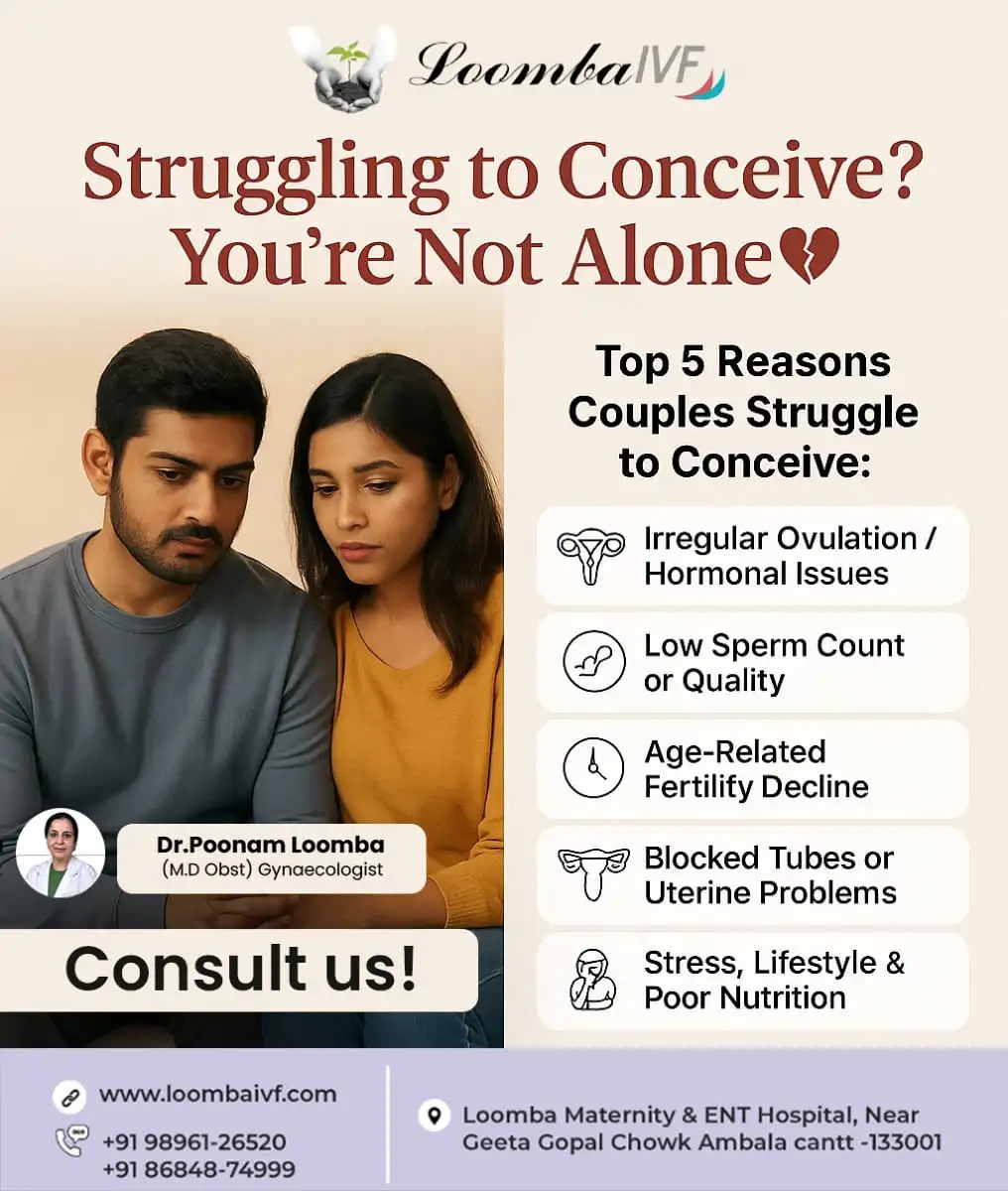
For many families, giving birth is one of the most rewarding experiences. However, not all journeys to parenthood are straightforward. It’s quite common to see Couples struggle to conceive, even after months or years of trying. This can be a very emotion-filled and stressful process, however knowing what the hurdles are can help clarify things. Modern medical science has a variety of highly effective fertility treatments available, and when used in conjunction with the proper medical support, many couples can achieve their goal of parenthood.
In this blog post, we’ll share common reasons couples struggle to conceive, when to seek treatment, and how Loomba IVF—ranked among the Best IVF Clinics in Ambala—can help.
What Is Infertility?
Infertility is most commonly defined by the inability to achieve a pregnancy after 12 months of regular unprotected intercourse. If the woman is older than 35, the definition is shortened to 6 months. Globally, millions of couples experience infertility, and the cause can be the woman, the man, or both partners.
Here are the most common causes:
1. Ovulation Disorders
A woman’s ability to regularly release an egg is critical for conception. Health conditions such as polycystic ovary syndrome (PCOS), thyroid problems, or hormonal imbalances can interfere with ovulation when considering reproductive health for women.
2. Age
As you get older, fertility decreases. For women, egg quality and quantity start to decrease after age 35. For men, sperm quality also decreases because of age. Couples who comfortably delay pregnancy run into these issues pertaining to age.
3. Blocked Fallopian Tubes
Eggs travel from the ovary to the uterus by way of the fallopian tubes. If the fallopian tubes are blocked due to infections, pelvic surgery or endometriosis, fertilization will not take place.
4. Male Infertility Issues
About 40% of infertility is attributable to men. A man can have low sperm count, poor motility, an abnormal shape, or lifestyle issues such as smoking or drinking.
5. Endometriosis
Endometriosis is a painful condition in which tissue that resembles that which is found in the uterus develops outside the uterus. It can damage the ovaries, block the fallopian tubes, and affect the ability to implant.
6. Unexplained Infertility
In some cases, despite all the testing and the analysis, no clear reason can be identified or determined. This is commonly referred to as unexplained infertility (and for the couple it can be exasperating). Nevertheless, medical treatment can often help to improve the chances of conception.
7. Lifestyle Factors
Stress, being underweight or overweight, poor diet, consuming excess caffeine, smoking, and lack of physical exercise can all impact fertility in men and women.
8. Medical Conditions
Diabetes, autoimmune diseases, STIs, and medications may also be contributory factors.
When to seek help?
While many couples may struggle with infertility for many reasons, it is important to know when to seek medical care.
- If a woman is under 35 and has not conceived after 12 months of trying.
- If a woman is more than 35 and has not conceived after 6 months of trying.
- If there are irregular cycles or no menstrual cycle.
- If either partner has a known fertility issue or a history of pelvic/sexual health issues.
- If there have been multiple miscarriages.
At this point, visiting a trusted fertility center is the right step. Loomba IVF, regarded as one of the Best Pregnancy Hospitals in Ambala, provides comprehensive testing.
Role of Fertility Treatments
Medical science has progressed greatly in helping Couples struggle to conceive. Some of the common treatments include:
Ovulation Induction
Some medicine helps stimulate the ovaries to release eggs.
Intrauterine Insemination
Sperm gets directly into the uterus during ovulation.
In Vitro Fertilization (IVF)
Eggs are collected and fertilized by sperm in a lab, and the resulting embryos are returned to the uterus.
Intracytoplasmic Sperm Injection
A single sperm is injected into an egg, useful for male infertility.
Egg or Sperm Donation
Options for couples with very low fertility.
Depending on modern technology and their medical team, treatment at Loomba IVF is offered. It stands among the Best IVF Clinics in Ambala and has helped many families in realizing their dreams of parenthood.
Frequently Asked Questions
1. How common is it for couples to struggle to conceive?
It is more common than many think. Around 1 in 6 couples face infertility issues worldwide.
2. Does age affect fertility in both men and women?
Yes. Women’s fertility declines after 35, while men experience reduced sperm quality as they age.
3. Can lifestyle changes improve fertility?
Yes – maintaining a healthy weight, balanced diet, exercise, and reducing alcohol or smoking can improve fertility.
4. When should couples consult a fertility specialist?
After 12 months of trying (6 months if the woman is over 35), a couple should seek medical advice.
5. What is the success rate of IVF treatment?
Success rate of IVF is variable depending on age and health of the couple but a pregnancy follows for many patients with IVF.
6. Is infertility always permanent?
No. With the right treatment, many cases of infertility can be resolved.
Final Thoughts
It’s completely normal to feel anxious and worried while couples struggle to conceive. Remember that infertility is not the end of the road. With appropriate medical care, lifestyle changes, and current fertility treatments, parenthood is still an option.
If you or someone you know faces infertility, especially when couples struggle to conceive, seeking help from a trusted center like Loomba IVF can provide the first step to renewed faith. As a recognized member of the Best Pregnancy Hospitals in Ambala category, Loomba IVF offers the appropriate guidance, technology, and care to help families bless themselves with the gift of parenthood.
👉 Schedule a Consultation today with Loomba IVF and take the first step towards your dream of parenthood.
